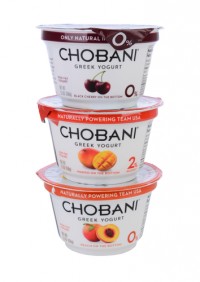Suit says Chobani Greek Yogurt isn't made in Greece and has more sugar than an ice cream bar
A deceptive-practices lawsuit (PDF) filed Thursday in Brooklyn federal court says Chobani Greek Yogurt is deceptively marketed as a healthy product, though it typically contains more sugar than a Nestle fudge ice cream bar.
The yogurt lists “evaporated cane juice” as an ingredient, the suit says, even though the juice derivative “is nothing more than sugar dressed up to sound like a healthier sweetener.” The product also displays “0%” on the top and front of its product packaging, without providing any context as to what “0%” means, the suit alleges.
“Moreover,” the suit says, “defendants purposefully market their products as ‘Greek’ yogurts when there is nothing ‘Greek’ about the products. None of the products made in the U.S. are made in Greece or made by Greek nationals.”
The would-be class-action suit claims the advertising violates laws in all 50 states that bar false advertising and business practices that are unfair, deceptive, fraudulent and unconscionable.
The New York Daily News and the New York Post covered news of the lawsuit. The company said consumers know “0%” refers to fat, and the word “Greek” is a product description rather than a reference to the yogurt’s origins, the Post says.
Chobani provided a statement to the ABA Journal. “Our fans—mothers, fathers, kids, nutritionists—understand that equating Chobani to an ice cream bar is like comparing apples and watermelons,” the statement said. “Our yogurt is packed with protein (using three cups of fresh milk to make every cup of Chobani), our fruit is real fruit and we have always been committed to making delicious food using only natural ingredients. We’re proud that the majority of our products contain less sugar than competing brands (an average of 20 percent less) and that our Chobani Kids Tubes contain approximately 30 percent less sugar than the leading kids yogurt products.
“Our fans also understand that, much like English muffins and French fries, Greek yogurt is a product description about how we authentically make our yogurt and not about where we make our yogurt in upstate New York and Idaho. We market our products transparently with labeling that is clear, commonly understood and widely used and all of our labels comply with all laws and regulations.”
In a second would-be class action (PDF) filed Tuesday, the plaintiffs target Fage Greek yogurt for its “total 0%” product line. The suit says the yogurt maker provides no context for the term and many of its products also contain more sugar than cookies.
A California judge dismissed a similar suit last month because plaintiffs couldn’t prove they bought the yogurt because of the yogurt’s cane-juice marketing, the New York Post says.
Updated at 10:25 a.m. to include additional information from Chobani.




